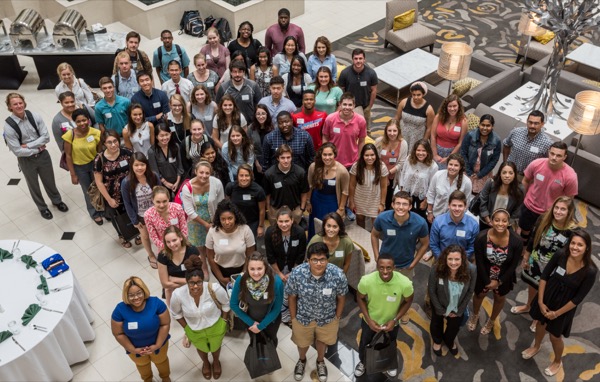
INBRE scholars
Delaware INBRE accepting applications for 2016 Summer Scholars program
8:15 a.m., Feb. 5, 2016--Delaware INBRE is now accepting applications for its 2016 Summer Scholars program, which provides undergraduate biomedical research opportunities across the state.
The 11-week program offers rising sophomore, juniors and seniors the chance to do mentored research at one of the six Delaware INBRE partner institutions: the University of Delaware, Delaware State University, Wesley College, Delaware Technical Community College, Christiana Care Health System and Nemours/Alfred I. duPont Hospital for Children. Students are paid a stipend for their participation in the program.
Campus Stories
From graduates, faculty
Doctoral hooding
Applications are available at this website. They are due March 1, and students will be notified if they are selected by April 5.
INBRE stands for the IDeA Network of Biomedical Research Excellence, and it is funded by the National Institute of General Medical Sciences. One of the goals of Delaware INBRE is to build research capacity in the state, in part by increasing the number of biomedical researchers.
More than 500 Delaware students have participated in the Summer Scholar program since its inception. Last year’s crop of Summer Scholars focused their research on topics including concussions, gun violence, palliative care and reducing torque on the lower back of golfers.
Students showed off their hard work during the sixth-annual Celebratory Symposium held at UD’s Harker Interdisciplinary Science and Engineering Laboratory.
“Delaware INBRE Summer Scholars have the opportunity to make a real impact through their research, both in their education and the community at large,” said Katie Lakofsky, director of the education and professional development core for Delaware INBRE. “For many, it’s their first chance to work in a lab, so it gives them real-world experience and training that’s critical in so many fields.”
In addition to the chance to do mentored research, students also are exposed to other parts of research life, including how to create and develop a scientific poster, how to talk about the work they’ve done and ethical considerations in science and medicine.
Markia Smith, a junior biochemistry major, spent last summer as an INBRE scholar, working with research mentor John Slater, an assistant professor of biomedical engineering. She hoped her work, which focused on cellular mechanisms, would give her a firsthand look at how research can impact the lives others.
“And that is exactly what I received,” said Smith, who remains an active member of the lab. “I would say this lab has only reaffirmed my love of science and more specifically, the medical field. From my research, I have been able to make more connections between the material I am learning in class to the experiments I complete in the lab.”
Photo by Kathy F. Atkinson








